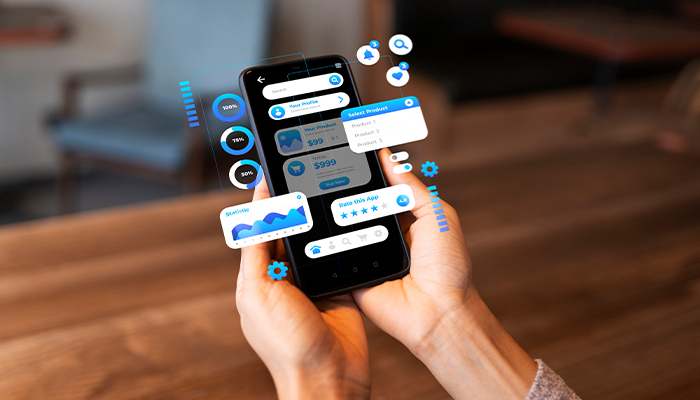Integrating Machine Learning with Your Android App

JUL, 01, 2024 15:30 PM
Integrating Machine Learning with Your Android App
In this age of technology, applications are becoming more sophisticated and effective. A machine-learning Android app is among the latest technologies in use. It provides software applications and systems with extremely intelligent and creative capabilities to perform amazing feats.
Through the integration of ML cameras, smartphones can automatically recognize faces. Voice assistant applications such as Siri, Alexa, and Google Assistant can help users with much greater speed.
If you're planning to make use of the power of machine learning (ML) to create an intelligent Android application that is a delight to users, In this article, we will guide you through applying machine learning to Android app development.
What is Machine Learning?
The field of machine learning can be described as a subfield within artificial intelligence (AI). It is focused on the creation of self-learning models and algorithms. These models can allow the system or software to learn. This helps in making predictions and making decisions without having to be explicitly programmed.
Why is the Integration of Machine learning into Android apps increasing?
Machine learning is a crucial area in artificial intelligence. It can be used in many ways to develop intelligent and automated functions for software and applications. Android is an open-source operating system. It gives developers a wider range for the development of new features.
So, when we look at recent market trends, the data shows that machine learning is advancing in the world of app development. The massive increase in the use of ML in Android app development is a result of
Benefits of Applying Machine Learning to Android App Development
There are numerous benefits to making use of ML in the development of Android applications. Developers can integrate ML into Android app development to increase the capabilities of apps and improve the user experience, among other things. These benefits allow businesses to respond to the ever-changing demands of their users and capitalize on market trends.
Personalized User Experience
ML allows apps to offer customized experiences for users. By analyzing user inputs, data, and preferences, ML algorithms can personalize content and features to suit the needs of every user. This personalization improves user satisfaction, engagement, and retention.
Intelligent Automation
Machine learning is a way to automate a variety of tasks in an application. It will reduce manual work and increase effectiveness. Chatbots, for instance, are made of machine learning or the natural processing of languages. They can respond to customer requests as well as provide support and help users in real-time. This improves the user experience, reduces time, and enhances customer service.
Advanced Analytics and Insights
ML can perform powerful analysis of data. It lets apps extract important insights and make predictions. By studying the behavior of users, patterns of app usage, and other pertinent metrics, the ML algorithms can provide useful insight. These insights help app developers better understand their users. This means they can make better decisions based on data and improve the performance of their apps.
Enhanced app capabilities
The use of machine learning can enhance an application's capabilities, making it sophisticated. Machine learning models can enable image recognition and natural language processing sentiment analysis, as well as voice recognition functions. This enables applications to comprehend and communicate with users in more natural and effective ways.
Improved Efficiency and Accuracy
ML algorithms can automate complicated tasks, decreasing human error while increasing efficiency. For instance, when it comes to tasks that require image recognition, ML models can attain greater accuracy than traditional algorithms. Automating processes allows applications to cut down on time, increase accuracy, and produce better results.
Competitive Advantage
Implementing machine learning into Android apps could give you an edge on the market. People are increasingly looking for an intelligent and personalized experience. Apps that meet these requirements are more likely to be noticed. Thus, by using machine learning technology, applications will be distinguished in the marketplace and ultimately gain more attention from users.
Steps to Apply Machine Learning in Android App Development
Machine learning is complicated-level programming. Implementing machine learning into Android application development requires solid knowledge of ML development principles. You should ensure that when you employ mobile developers, they are proficient in programming skills and are proficient using machine learning tools, frameworks, or API integrations. To implement ML to develop Android apps, you will need to follow the following steps:
- Identify the problem and goal.
Choose the problem or function in your app that could profit from the machine-learning process. This could include anything. For example, recommendation systems such as predictive intelligence, natural language processing, and image recognition. The initial step should be to identify the goal that you want to achieve through machine learning.
- Gather and prepare data.
Data is crucial for the training of machine models for learning. Gather relevant and reliable data that is in line with your goals and the problem. Be sure the data is labeled and arranged. Also, let the data be cleaned, normalized, and rearranged as needed.
- Choose the Machine Learning Frameworks and Tools
There are a variety of machine learning frameworks and tools to use for Android application development. Based on the ML approach you choose to use and the project's requirements, it is recommended to use the appropriate stacks of ML technology. Below are a few of the of the most widely used ML frameworks and tools that you can integrate into your machine learning application design for Android.
- Select the machine learning approach.
Choose the right machine-learning method depending on your needs and your data. The most common ML methods include supervised learning, unsupervised learning, and reinforcement learning. It is important to select the algorithm or models that are appropriate to your needs. Consider whether the ML project includes clustering algorithms as well as support vector machines, neural networks, and even decision trees.
- Train the machine learning model.
Split the data into sets for testing and training. Use this training set to develop your machine-learning model. To do this, you'll need to feed it with labeled data and then modify the parameters of your model to reduce mistakes. It is possible to repeat the process and then refine the model according to your needs. Make use of the test set to test how well the model performs. Then, ensure that it applies well to data that isn't seen.
- Integration of your model into the Android app
Once your ML model has been tested and trained, it is time to integrate it into your Android application. Based on the level of complexity and the requirements the app will have, you may choose between a variety of ways to integrate:
Integration with On-Device: If the model isn't too large and can run effectively on a device, you can incorporate it directly into the application. Tools such as TensorFlow Lite and PyTorch Mobile can be used to modify and improve the model to run on Android devices.
Cloud-Based Integration: To handle larger models or more computationally demanding tasks, it is possible to run the model on a cloud server and then create API calls through the app to transfer input data as well as receive predictions. Thus, this method allows computationally intensive computations and can be scalable.
- Implement model inference.
Include the code in your application to use model inference. This means that by using the model trained, it will be able to predict or classify events based on data from the past. Then, you can pass the data input to the model and then process the output. Then, integrate that data into app functions or the user interface.
- Continuously improve and update.
You must monitor the effectiveness of your machine-learning model in real-world scenarios and collect feedback. Take user information and repeat the process on your model to improve its efficiency and accuracy. Keep your model up-to-date to keep up with the changing patterns of data and the needs of users. This can help your app function regularly.
- Test and validate
Make sure you thoroughly test your application using the machine-learning capabilities that are integrated into your app. Test the performance and accuracy of the model using a variety of scenarios and usage cases. Make sure the application functions properly and delivers the desired user experience.
Cost of Applying Machine Learning to Android App Development

On average, a machine-learning project could cost anywhere from $50,000 to $300,000. This is merely an estimate. The cost of integrating machine learning into Android application development varies based on several aspects.
For example, the number of frameworks, resources, models of ML, the size of the data and features, and so on. The best solution is to seek out an experienced Android app development firm that specializes in machine learning development. The final cost will depend on the requirements of your particular project.
Wrapping Up
The use of machine learning in Android app development creates many new opportunities for companies that wish to develop smart, innovative, and beneficial applications for users. With ML, developers will be able to unlock the next stage of innovation and develop an extremely user-friendly and intuitive experience. Perfection Geeks is known as thebest Android app development company.
Since the market for machine learning is growing, both developers and businesses can access a vast selection of frameworks, tools, and technology for efficiently applying machine learning to Android applications.
However, using machine learning requires a lot of expertise. It is recommended to seek out PerfectionGeeks, the most reliable Android app development firm that has proven expertise in integrating machine learning to create Android applications. Also, PerfectionGeeks is a reliable source that has decades of experience in the development of high-quality ML-powered apps for Android and other platforms.
FAQs
1. What does it cost to integrate machine learning into mobile apps?
On average, it will cost anywhere from $30,000 to $200k to incorporate machine learning intomobile app development. The exact amount will depend on the specific project's requirements. Therefore, the most effective approach is to seek advice from an experienced mobile app development firm. They are experts in ML development. They can provide you with an estimate for your project based on their experience.
2. What is the best way to make ML utilized in mobile applications?
There are a variety of methods of machine learning that could be utilized in mobile applications. It is possible to integrate it into mobile apps to facilitate the processing of data. It also allows self-decision-making algorithms. Thus, by enabling the ML feature, you can create sophisticated or smart features for the application.
3. What programming language would be most suitable to use machine learning in mobile applications?
Machine learning is a complex level of programming on computers. Developers must possess the basic programming or foundational abilities to utilize machine learning in the development of apps. Therefore, with the right abilities, developers can use the most well-known programming languages. For example, Python, Java, JavaScript, and R implement ML in application development.
Strategy
Design
Blockchain Solution
Development
Launching
Testing
Maintenance
Contact US!
India

Plot 378-379, Udyog Vihar Phase 4 Rd, near nokia building, Electronic City, Phase IV, Sector 19, Gurugram, Haryana 122015
Copyright © 2026 PerfectionGeeks Technologies | All Rights Reserved | Policy
Strategy
Design
Blockchain Solution
Development
Contact US!
India 
Plot 378-379, Udyog Vihar Phase 4 Rd, near nokia building, Electronic City, Phase IV, Sector 19, Gurugram, Haryana 122015
USA 
1968 S. Coast Hwy, Laguna Beach, CA 92651, United States
Copyright © 2026 PerfectionGeeks Technologies | All Rights Reserved | Policy






